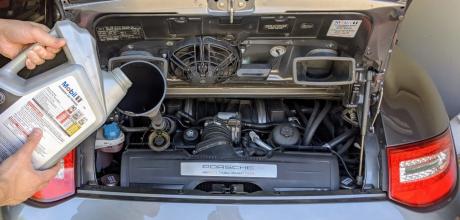The Porsche 911 is often split into air and water camps, but all Neunelfers rely on oil. What’s its role?

Engines are made of many moving components, working together under finely engineered tolerances. To do that, they need oil, a viscous fluid that lubricates all those moving components, reducing friction and cooling them in the process. Without it, bearing surfaces would quickly overheat and wear out in minutes. This is the job of oil pressure: the engineered resistance created by the fluid being pumped through the engine as it rotates, ensuring moving parts are lubricated as intended. Low oil pressure stems from wear, and that wear decreases resistance (pressure) for the flowing fluid.
Technology explained — OIL
Oil does more than just lubricate. It also cleans, removing debris as it flows around the engine. Contaminants are collected by the oil, and carried to the filter, where they are removed, permitting clean oil to then continue around the engine. After shut off, any suspended contaminants are deposited by the oil, rather than held in suspension.
It can be made from crude oil (mineral oil) or from a synthetic base (fully synthetic oil) where the base oil is broken down and reassembled to a specification. Either way, it’s rated by viscosity using two numbers, where the lower the number, the thinner the oil. For example, take 20W-50 oil for older 911s. The first number, with the W suffix, indicates the thickness when cold. The second figure indicates the thickness when at operating temperature, wicking maximum heat from the moving components.
Selecting the correct grade is an art, which is why Porsche specifies different grades for different engines. Too thick and it won’t lubricate when cold. Too thin and it can leak past mating faces, gaskets or seals. Older engines need thicker, mineral oils like 20W-50, but a later engine like a 992 will use a much thinner 0W-40 fully synthetic. There’s a middle ground, where 1977 3.0 Turbos to 993 use a 10W-60 fully synthetic, permitting the best of both worlds.
Oils in transmissions perform an equivalent task, just without dealing with combustion contaminants. They will, however, deal with contaminants through component wear in a similar way to engine oil: removing, then discarding it. We ask a great deal of the fluid, so it does have a finite lifespan. Service intervals are designed to minimise wear and maximise component performance. With age, oils become acidic, and detergents wear out. It may be the last thing we associate with Porsche technology, but that would be wrong. From the first 911s to the prototypes being driven around the Weissach test track right now, they all rely on well-engineered oil.

